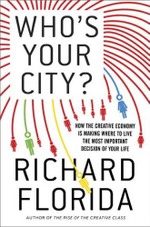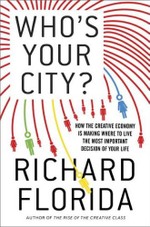Urmi in Urban Issues
 Richard Florida, doyen of all things city, has a new book out – Who’s Your City? While I have yet to read it, publicity materials and early reviews suggest that Florida has drawn on psychological analysis to answer his long-standing query: what is it that makes cities attractive to the “right kind” of people? (Florida’s entrepreneurial, wealth-creating creative class seems to include everyone from IT workers to ballerinas….come to think of it, the only people it doesn’t seem to include are teachers, lawyers and dentists – unless, of course, they are creative).
Richard Florida, doyen of all things city, has a new book out – Who’s Your City? While I have yet to read it, publicity materials and early reviews suggest that Florida has drawn on psychological analysis to answer his long-standing query: what is it that makes cities attractive to the “right kind” of people? (Florida’s entrepreneurial, wealth-creating creative class seems to include everyone from IT workers to ballerinas….come to think of it, the only people it doesn’t seem to include are teachers, lawyers and dentists – unless, of course, they are creative).
In an excerpt published in the Globe on Saturday, Florida explains that cities have personalities and that we flock to the cities that match our own, thereby reinforcing the city’s original (or ‘settler’) psychology. Commendably, these observations are backed by statistical analysis. (Veracity yet to be determined. Interested to see how the index for "neuroticism" is constructed – psychiatrists per capita plus rate of self-identification with Woody Allen or George Costanza?)
Florida finds the personality trait of being “open to experience” to be positively correlated to high regional economic growth based on “jobs in computing, science, arts, design, and entertainment; overall human capital levels and high-tech industry, income, and housing values.” So if “regional leaders must become more aware of how their region’s collective personality shapes the kinds of economic activities that it can do and the kinds of people it can attract, satisfy, and retain,” they should also know that being open makes you the richest.
Lest we think Florida’s writings are just airport lounge time-killers, Toronto, his beholden adoptive city, has been making policy choices that flow from these theories. Florida’s first works suggested that cities that want to attract economy-boosting citizens should not only focus on maintaining good health care, school systems and transportation infrastructure, but spend a great deal of time thinking about arts, leisure and culture. If we build it (the Opera House) or reno it (AGO, ROM), the cool kids will come.
So it’s when Florida moves from a fun ‘e-harmony for cities’ exercise to a policy one that things get interesting. This time, the implications might prove to be more revolutionary than a botched Gehry makeover. And it’s all due to what I term the ‘openness paradox.’
Florida’s openness premise is a valid one, and one worth emphasizing: “Places that tolerate or encourage openness to experience will ultimately attract people who seek environments in which they can feel free to express themselves.” When Florida hunts for correlations, he finds that openness has a lot to do with allowing for gay rights and bohemian living (watch Rent for more on this). I would assume that inter-ethnic and inter-faith living can’t be far behind. A love of art galleries and green living probably wouldn’t hurt either.
Toronto is among those cities that attracts citizens due to openness. I believe we fair well enough on the gay and bohemian index. But that’s not the only way we’re open. Toronto’s population growth is largely spurred by out-of-country immigration, more so now that Calgary has begun to steal our in-continent thunder (it's all that creative oil). That’s why Maclean’s global survey on attitudes to Canada is so instructive. It reveals what is perceived to be one of our greatest strengths: openness to allowing people of all cultures and faiths to keep their practices and ways of life. It's something that many of us, immigrant and non-immigrant alike, understandably take pride in.
But what happens when you are so open that you’re open to not changing?
Humans are not programmed to accept change easily. Even when we seek it out, we regulate it by deciding where our experiences will start and stop. Migrants to the city demonstrate profound openness to change. But the change being sought may be more profane in its characterization of quality of life: work, shelter, food and water. The more of it, the better. What if the line’s drawn here – and it’s not just about not exactly being okay with gay rights. Many choose to keep practicing traditional trades and stay in secure, time-honoured professions – not leap out onto the creative ledge. Many still want SUVs – even as city streets grow crowded. Throw in diverging views about the role of the women and you get the picture.
But if being open in a particular way = more creatives in the city = more prosperity, what does this mean for Toronto? Here are some thoughts:
1) Like a hapless dater, we are so open that we attract just about anyone. Perhaps our governments should continue to protect “openness” qualities without necessarily checking in with the masses. Holland has introduced a video briefing to let would-be immigrants know that their potential new home is really, really, really open. Likewise, Toronto’s new city slogan could be: we aim to be really, really, really open – so should you.
2) We are ants. We are not as open as we are conscientious. Florida holds that other traits, though less correlated to creativity, are still good: agreeableness lends itself to health care and management industries while conscientious workers are good for all industries. But Florida warns us that “conscientiousness alone is not enough to power regional growth.” No Tor-Buff-Chester for us.
3) Freud is dead. Toronto’s got real issues to deal with. We constantly lure highly-skilled people to the city on the pretense that we’re open to them working here (get the points, pass go) only to deny them worthy work experiences due to lack of Canadian experience, and is some cases, questionable credentialing requirements. The emphasis on creative classes, at a time when the country is experiencing a shortage of skilled tradespersons, is unbalanced. Like any thriving organism, we need it all. And neuroticism is not a fixed trait – no one, not even the creative armed with an i-pod, likes waiting for the 501 streetcar.
Urmi Desai is a policy analyst and a freelance writer specializing in urban issues. She believes herself to be creative. Urmi is editor of the Move Smartly blog. Email Urmi
Subscribe to Move Smartly by Email
Related Post:
March 17, 2008
City |



